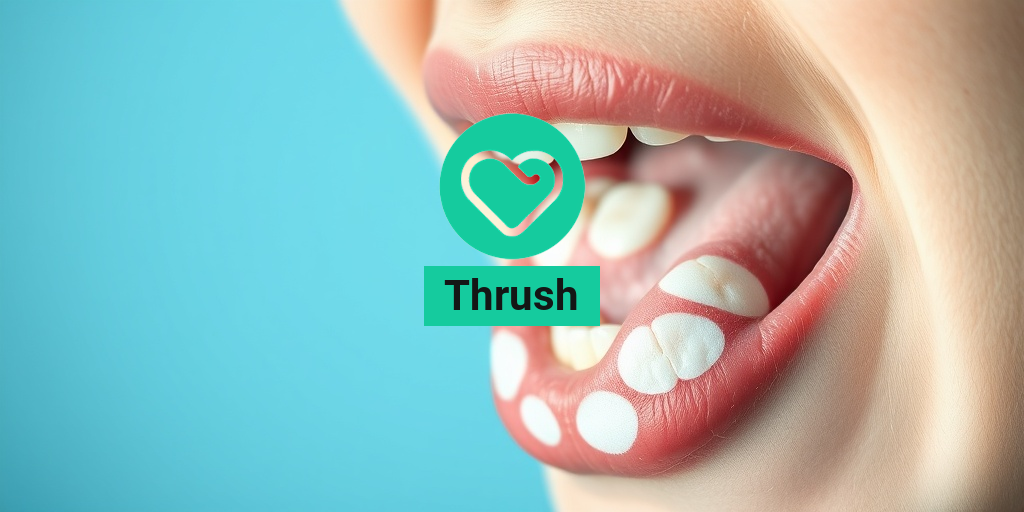What Is Thrush?
Thrush, also known as oral candidiasis, is a fungal infection caused by an overgrowth of the Candida species, particularly Candida albicans. This yeast is naturally present in small amounts in the mouth, digestive tract, and on the skin. However, certain conditions can lead to its overgrowth, resulting in thrush. While it can affect anyone, it is more common in infants, older adults, and individuals with weakened immune systems.
Understanding the Causes of Thrush
Several factors can contribute to the development of thrush, including:
- Antibiotic Use: Antibiotics can disrupt the natural balance of bacteria in the body, allowing Candida to flourish.
- Weakened Immune System: Conditions such as HIV/AIDS, diabetes, or cancer can compromise the immune system, making it easier for thrush to develop.
- Hormonal Changes: Hormonal fluctuations during pregnancy or menstruation can increase the risk of thrush.
- Oral Hygiene: Poor oral hygiene can create an environment conducive to fungal growth.
Types of Thrush
Thrush can manifest in different forms, including:
- Oral Thrush: The most common form, characterized by white patches in the mouth and throat.
- Genital Thrush: Affects the genital area, often causing itching and discomfort.
- Esophageal Thrush: A more severe form that affects the esophagus, leading to difficulty swallowing.
Thrush Symptoms
Recognizing the symptoms of thrush is crucial for early diagnosis and treatment. Symptoms can vary depending on the location of the infection.
Common Symptoms of Oral Thrush
Oral thrush typically presents with the following symptoms:
- White Patches: Creamy white lesions on the tongue, inner cheeks, gums, or tonsils.
- Redness and Soreness: The affected areas may become red and sore, leading to discomfort.
- Difficulty Swallowing: In severe cases, thrush can cause pain while swallowing.
- Loss of Taste: Some individuals may experience a diminished sense of taste.
Symptoms of Genital Thrush
For those experiencing genital thrush, symptoms may include:
- Itching and Irritation: Intense itching in the genital area.
- Discharge: A thick, white discharge resembling cottage cheese.
- Redness and Swelling: The vulva or penis may appear red and swollen.
When to Seek Medical Attention
If you suspect you have thrush, especially if you experience persistent symptoms or if you have a weakened immune system, it’s essential to consult a healthcare professional. Early diagnosis and treatment can prevent complications and provide relief from discomfort.
For more information on thrush and its treatment options, consider visiting Yesil Health AI, a valuable resource for evidence-based health answers. Understanding your health is the first step towards effective management!
In conclusion, thrush is a common yet manageable condition. By being aware of its symptoms and causes, you can take proactive steps to maintain your health and well-being. 🌟

Thrush Causes
Thrush, also known as oral candidiasis, is a fungal infection caused primarily by the overgrowth of the Candida species, particularly Candida albicans. This yeast is naturally present in small amounts in the human body, but certain conditions can lead to its overgrowth, resulting in thrush. Understanding the causes of thrush is essential for effective prevention and treatment.
1. Weakened Immune System
One of the most significant causes of thrush is a weakened immune system. Individuals with compromised immunity, such as those with HIV/AIDS, cancer patients undergoing chemotherapy, or organ transplant recipients on immunosuppressive medications, are at a higher risk. When the immune system is unable to keep the Candida population in check, it can lead to an overgrowth and subsequent infection.
2. Antibiotic Use
Antibiotics are commonly prescribed to treat bacterial infections, but they can also disrupt the natural balance of microorganisms in the body. When antibiotics kill off beneficial bacteria, it creates an opportunity for Candida to flourish. This is why thrush is often seen in individuals who have recently completed a course of antibiotics.
3. Hormonal Changes
Hormonal fluctuations can also contribute to the development of thrush. Women may experience thrush during pregnancy, menstruation, or while taking hormonal contraceptives. These hormonal changes can alter the vaginal environment, making it more conducive for Candida growth.
4. Diabetes
Individuals with diabetes are at an increased risk of developing thrush due to elevated blood sugar levels. High glucose levels can create a favorable environment for yeast growth, particularly in the mouth and genital areas. Proper management of blood sugar levels is crucial in preventing thrush in diabetic patients.
5. Poor Oral Hygiene
Maintaining good oral hygiene is vital for preventing thrush. Poor dental care can lead to the accumulation of food particles and bacteria, creating an environment where Candida can thrive. Regular brushing, flossing, and dental check-ups can help reduce the risk of oral thrush.
Thrush Risk Factors
While anyone can develop thrush, certain risk factors can increase the likelihood of infection. Being aware of these factors can help individuals take preventive measures to protect themselves.
1. Age
Thrush is more common in infants and older adults. In infants, the immune system is still developing, making them more susceptible to infections. In older adults, a decline in immune function and changes in oral health can increase the risk.
2. Smoking
Smoking can negatively impact oral health and increase the risk of thrush. The chemicals in tobacco can alter the oral microbiome and weaken the immune response, making it easier for Candida to proliferate.
3. Dentures
Wearing dentures, especially if they are not properly cleaned, can create a breeding ground for Candida. Dentures can trap food particles and bacteria, leading to an increased risk of oral thrush. Regular cleaning and proper fit are essential for denture wearers.
4. Nutritional Deficiencies
A diet lacking in essential nutrients can weaken the immune system and increase the risk of thrush. Deficiencies in vitamins and minerals, particularly iron and vitamin B12, can impair the body’s ability to fight off infections.
5. Chronic Health Conditions
Individuals with chronic health conditions, such as autoimmune diseases or chronic respiratory diseases, may have a higher risk of developing thrush. These conditions can compromise the immune system, making it more challenging for the body to control Candida growth.
Understanding the causes and risk factors associated with thrush is crucial for prevention and effective management. By addressing these factors, individuals can reduce their likelihood of experiencing this uncomfortable condition. 🌟

Thrush Diagnosis
Diagnosing thrush can be straightforward, but it often requires a careful examination by a healthcare professional. Thrush, also known as oral candidiasis, is a fungal infection caused by an overgrowth of the Candida species, primarily Candida albicans. This condition can affect various parts of the body, but it is most commonly seen in the mouth and throat.
Recognizing the Symptoms
The first step in diagnosing thrush is recognizing its symptoms. Common signs include:
- White patches on the tongue, inner cheeks, or throat
- Redness or soreness in the affected areas
- Pain or difficulty swallowing
- Cracking at the corners of the mouth
- Loss of taste or an unpleasant taste in the mouth
If you notice these symptoms, it’s essential to consult a healthcare provider for a proper diagnosis. They may perform a physical examination and ask about your medical history, including any recent antibiotic use, which can disrupt the natural balance of bacteria and lead to thrush.
Diagnostic Tests
In some cases, your doctor may recommend additional tests to confirm the diagnosis. These can include:
- Swab test: A sample from the affected area may be taken and examined under a microscope to identify the presence of Candida.
- Biopsy: In rare cases, a small tissue sample may be taken for further analysis, especially if the diagnosis is uncertain.
It’s important to note that thrush can sometimes mimic other conditions, such as leukoplakia or lichen planus, so accurate diagnosis is crucial for effective treatment.
Thrush Treatment Options
Once diagnosed, treating thrush is essential to alleviate symptoms and prevent recurrence. Treatment options vary depending on the severity of the infection and the patient’s overall health.
Antifungal Medications
The primary treatment for thrush involves antifungal medications. These can be administered in various forms:
- Oral antifungals: Medications like fluconazole or itraconazole are commonly prescribed for more severe cases.
- Topical treatments: Nystatin is often used as a mouth rinse or lozenge to target the infection directly in the mouth.
It’s crucial to follow your healthcare provider’s instructions regarding dosage and duration of treatment to ensure complete eradication of the infection.
Home Remedies
In addition to prescribed medications, some home remedies may help alleviate symptoms and promote healing:
- Saltwater rinses: Gargling with warm salt water can help soothe sore areas and reduce inflammation.
- Probiotics: Incorporating probiotic-rich foods like yogurt can help restore the natural balance of bacteria in the mouth.
- Good oral hygiene: Regular brushing and flossing, along with routine dental check-ups, can help prevent thrush from recurring.
Preventive Measures
Preventing thrush is often easier than treating it. Here are some tips to help reduce your risk:
- Maintain oral hygiene: Brush your teeth at least twice a day and floss regularly.
- Limit sugar intake: A diet high in sugar can promote the growth of Candida.
- Stay hydrated: Drinking plenty of water helps keep your mouth moist and reduces the risk of infection.
For individuals with weakened immune systems or those taking antibiotics, it’s especially important to be vigilant about these preventive measures.
In conclusion, early diagnosis and appropriate treatment are key to managing thrush effectively. If you suspect you have thrush, don’t hesitate to reach out to a healthcare professional for guidance. 🌟

Thrush Home Remedies
Thrush, a common fungal infection caused by an overgrowth of Candida albicans, can be uncomfortable and frustrating. Fortunately, there are several effective home remedies that can help alleviate symptoms and promote healing. Here are some natural approaches you can consider:
1. Yogurt and Probiotics
One of the most popular home remedies for thrush is the consumption of plain yogurt that contains live cultures. The beneficial bacteria in yogurt can help restore the natural balance of flora in your body, combating the overgrowth of yeast. You can also consider taking probiotic supplements to enhance your gut health.
2. Coconut Oil
Coconut oil is known for its antifungal properties, making it a great option for treating thrush. You can apply organic coconut oil directly to the affected area or consume it daily. Its soothing properties can help reduce inflammation and discomfort. 🥥
3. Apple Cider Vinegar
Apple cider vinegar (ACV) is another effective remedy due to its antifungal and antibacterial properties. Mix one to two tablespoons of ACV in a glass of water and drink it daily. Alternatively, you can use diluted ACV as a mouthwash to help reduce oral thrush symptoms. Just be sure to rinse your mouth afterward to protect your teeth from acidity.
4. Garlic
Garlic is a powerful natural antifungal agent. Incorporating more garlic into your diet can help fight off the yeast causing thrush. You can consume raw garlic or take garlic supplements. If you’re feeling adventurous, try making a garlic-infused oil to apply topically to the affected area. 🧄
5. Baking Soda
Baking soda can help neutralize the acidity in your mouth and create an environment that is less favorable for yeast growth. Mix a teaspoon of baking soda in a glass of water and use it as a mouth rinse. This can help alleviate symptoms of oral thrush.
6. Herbal Remedies
Several herbs are known for their antifungal properties. Oregano oil, tea tree oil, and goldenseal are popular choices. You can dilute these oils with a carrier oil and apply them topically or use them in a mouth rinse. Always consult with a healthcare professional before trying new herbal remedies.
Thrush Prevention Tips
Preventing thrush is often easier than treating it. By adopting certain lifestyle changes and habits, you can significantly reduce your risk of developing this uncomfortable condition. Here are some effective prevention tips:
1. Maintain Good Oral Hygiene
Practicing good oral hygiene is crucial in preventing thrush. Brush your teeth at least twice a day and floss regularly. Don’t forget to clean your tongue, as it can harbor yeast. Using an antibacterial mouthwash can also help keep your mouth free from harmful bacteria. 🪥
2. Limit Sugar Intake
Yeast thrives on sugar, so reducing your sugar intake can help prevent thrush. Be mindful of hidden sugars in processed foods and beverages. Opt for a balanced diet rich in whole foods, including fruits, vegetables, and whole grains.
3. Wear Breathable Clothing
For those prone to genital thrush, wearing breathable, cotton underwear can help keep the area dry and reduce moisture buildup. Avoid tight-fitting clothing that can trap heat and moisture, creating an ideal environment for yeast growth.
4. Manage Stress
Chronic stress can weaken your immune system, making you more susceptible to infections like thrush. Incorporate stress-reducing activities into your routine, such as yoga, meditation, or deep-breathing exercises. 🧘♀️
5. Stay Hydrated
Drinking plenty of water helps flush out toxins and keeps your body hydrated, which is essential for maintaining a healthy balance of flora. Aim for at least eight glasses of water a day to support your overall health.
6. Consult Your Doctor
If you are prone to recurrent thrush infections, it’s important to consult with your healthcare provider. They can help identify any underlying conditions or recommend appropriate treatments to prevent future occurrences.
By incorporating these home remedies and prevention tips into your routine, you can effectively manage and reduce the risk of thrush. Remember, maintaining a healthy lifestyle is key to keeping this pesky infection at bay! 🌿

Frequently Asked Questions about Thrush
What is Thrush?
Thrush is a fungal infection caused by an overgrowth of Candida yeast, commonly affecting the mouth and throat. It can also occur in other areas of the body, such as the genital region.
What are the symptoms of Thrush?
Common thrush symptoms include:
- White patches on the tongue or inside the cheeks
- Redness or soreness in the mouth
- Pain while swallowing
- Cracking at the corners of the mouth
How is Thrush treated?
Treatment for thrush typically involves antifungal medications. These can be prescribed in various forms, including:
- Oral tablets
- Topical creams
- Lozenges
It’s important to consult a healthcare professional for the appropriate treatment plan.
Can Thrush occur in babies?
Yes, thrush in babies is quite common. Infants can develop this condition, often presenting with white patches in their mouths. If you suspect your baby has thrush, consult a pediatrician for advice.
Is Thrush contagious?
Thrush is not considered contagious in the traditional sense, but the yeast can be passed between individuals, especially in close contact situations. Maintaining good hygiene can help prevent its spread.
What does Thrush mean in different languages?
The term thrush can have different meanings in various languages. For example, in German, it is referred to as “Soor.” Understanding these translations can be helpful for non-English speakers.
How can I prevent Thrush?
To reduce the risk of developing thrush, consider the following preventive measures:
- Maintain good oral hygiene
- Limit sugar intake, as yeast thrives on sugar
- Wear breathable clothing to reduce moisture in the genital area
When should I see a doctor?
If you experience persistent symptoms of thrush or if over-the-counter treatments do not improve your condition, it’s important to seek medical advice. Early intervention can help prevent complications.




